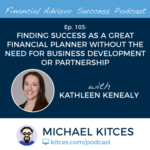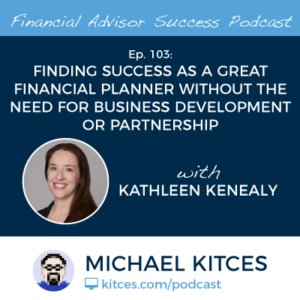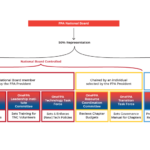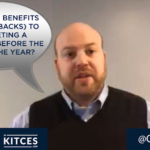Enjoy the current installment of "weekend reading for financial planners" – this week's edition kicks off with a fresh look at the rise of T shares and Clean shares, which emerged after the Department of Labor's fiduciary rule as a way to provide less conflicted mutual fund share class options for broker-dealers to make available on their platforms... though with the DoL fiduciary rule being struck down, T shares have vanished almost entirely and Clean shares are primarily surviving in their "semi-bundled" form that still permits at least some revenue-sharing payments to platforms. Though with the explosive growth of truly-no-revenue-sharing Clean shares in fiduciary retirement plans, the potential remains for a Clean shares resurgence amongst individual financial advisors as well... particularly if the regulators re-emerge with a new fiduciary rule in 2019.
From there, we have a number of retirement planning articles this week, including a look at how couples often benefit significantly from a financial perspective by not retiring at the same time (facilitating everything from delayed Social Security for the higher-earning spouse to employer-provided health insurance to bridge the gap from retirement to Medicare at age 65), the factors that drive when couples do (or don't) retire together, how Baby Boomers are emerging as the "loneliest" generation in retirement (due to lower rates of children and higher rates of divorce) with substantial loneliness-related health complications, and the rise of a new model for promoting social connectedness for seniors called the Villages (started with the Beacon Hill Village in Boston) that encourages "younger" senior citizens in their 50s, 60s, and 70s to support and interact with older seniors in their 80s and 90s with a social pay-it-forward ethos.
There are also a number of practice management articles, from rising fee pressure amongst asset managers driving them into the wealth management business where they're increasingly competing with financial advisors themselves, to some ideas about how advisors can better differentiate in an increasingly crowded advisor marketplace, the ways that advisors sometimes unwittingly negotiate "against themselves" on their advisory fees (conceding pricing discounts for all based on just a few outlier clients), and a look at how one advisory firm rolled out a "Milestone Rewards" loyalty program that discounts client fees if/when they stay with the firm for at least 3 years.
We wrap up with three interesting articles, all around the theme of advisor regulation in 2018 and 2019: the first looks at how tumultuous the changes in advisor regulation have been in Australia, which went through an even more extreme version of fiduciary rulemaking back in 2012 and is now struggling with the aftermath consequences of product manufacturing firms that employed their own advisors and continued to give conflicted advice anyway; the second explores how the regulatory shift in Australia is fundamentally shifting power away from investment product manufacturers and into the hands of advisors and clients themselves (which is good for advisors and consumers, but not something the industry is willing to let go of lightly!); and the last is a look at some of the issues that may play out with the SEC's own looming "Regulation Best Interest" proposal anticipated to be issued in revised form in 2019, which has already been under fire not only from fiduciary advocates but even the study that the SEC itself commissioned RAND to conduct, that found that the disclosure-based Form CRS only confuses consumers even more about the actual differences between the standards of care that apply to brokers versus investment advisers.
Enjoy the "light" reading!










